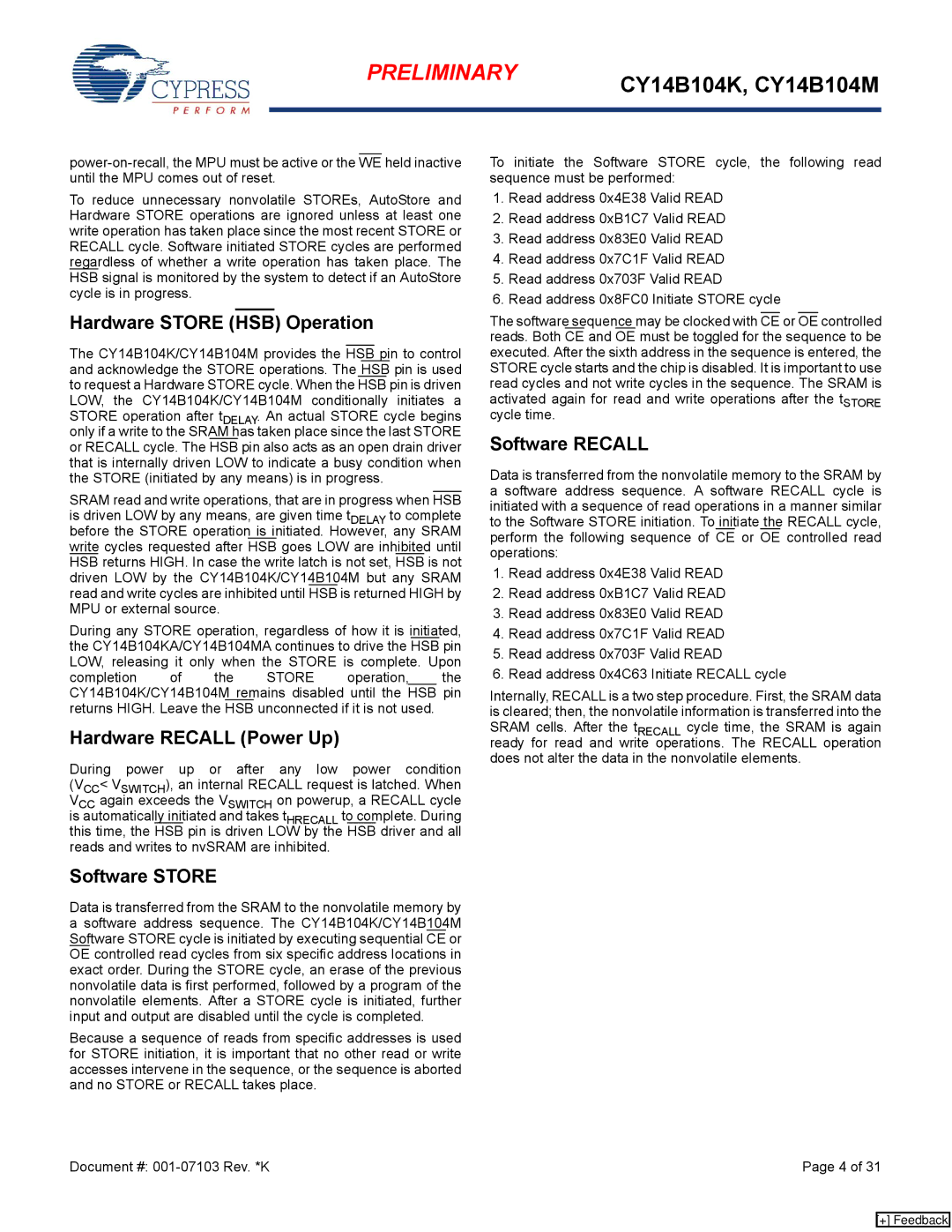
PRELIMINARY | CY14B104K, CY14B104M |
|
To reduce unnecessary nonvolatile STOREs, AutoStore and Hardware STORE operations are ignored unless at least one write operation has taken place since the most recent STORE or RECALL cycle. Software initiated STORE cycles are performed regardless of whether a write operation has taken place. The HSB signal is monitored by the system to detect if an AutoStore cycle is in progress.
Hardware STORE (HSB) Operation
The CY14B104K/CY14B104M provides the HSB pin to control and acknowledge the STORE operations. The HSB pin is used to request a Hardware STORE cycle. When the HSB pin is driven LOW, the CY14B104K/CY14B104M conditionally initiates a STORE operation after tDELAY. An actual STORE cycle begins only if a write to the SRAM has taken place since the last STORE or RECALL cycle. The HSB pin also acts as an open drain driver that is internally driven LOW to indicate a busy condition when the STORE (initiated by any means) is in progress.
SRAM read and write operations, that are in progress when HSB is driven LOW by any means, are given time tDELAY to complete before the STORE operation is initiated. However, any SRAM write cycles requested after HSB goes LOW are inhibited until HSB returns HIGH. In case the write latch is not set, HSB is not driven LOW by the CY14B104K/CY14B104M but any SRAM read and write cycles are inhibited until HSB is returned HIGH by MPU or external source.
During any STORE operation, regardless of how it is initiated, the CY14B104KA/CY14B104MA continues to drive the HSB pin LOW, releasing it only when the STORE is complete. Upon
completion of the STORE operation, the CY14B104K/CY14B104M remains disabled until the HSB pin returns HIGH. Leave the HSB unconnected if it is not used.
Hardware RECALL (Power Up)
During power up or after any low power condition (VCC< VSWITCH), an internal RECALL request is latched. When VCC again exceeds the VSWITCH on powerup, a RECALL cycle is automatically initiated and takes tHRECALL to complete. During this time, the HSB pin is driven LOW by the HSB driver and all reads and writes to nvSRAM are inhibited.
To initiate the Software STORE cycle, the following read sequence must be performed:
1.Read address 0x4E38 Valid READ
2.Read address 0xB1C7 Valid READ
3.Read address 0x83E0 Valid READ
4.Read address 0x7C1F Valid READ
5.Read address 0x703F Valid READ
6.Read address 0x8FC0 Initiate STORE cycle
The software sequence may be clocked with CE or OE controlled reads. Both CE and OE must be toggled for the sequence to be executed. After the sixth address in the sequence is entered, the STORE cycle starts and the chip is disabled. It is important to use read cycles and not write cycles in the sequence. The SRAM is activated again for read and write operations after the tSTORE cycle time.
Software RECALL
Data is transferred from the nonvolatile memory to the SRAM by a software address sequence. A software RECALL cycle is initiated with a sequence of read operations in a manner similar to the Software STORE initiation. To initiate the RECALL cycle, perform the following sequence of CE or OE controlled read operations:
1.Read address 0x4E38 Valid READ
2.Read address 0xB1C7 Valid READ
3.Read address 0x83E0 Valid READ
4.Read address 0x7C1F Valid READ
5.Read address 0x703F Valid READ
6.Read address 0x4C63 Initiate RECALL cycle
Internally, RECALL is a two step procedure. First, the SRAM data is cleared; then, the nonvolatile information is transferred into the SRAM cells. After the tRECALL cycle time, the SRAM is again ready for read and write operations. The RECALL operation does not alter the data in the nonvolatile elements.
Software STORE
Data is transferred from the SRAM to the nonvolatile memory by a software address sequence. The CY14B104K/CY14B104M Software STORE cycle is initiated by executing sequential CE or OE controlled read cycles from six specific address locations in exact order. During the STORE cycle, an erase of the previous nonvolatile data is first performed, followed by a program of the nonvolatile elements. After a STORE cycle is initiated, further input and output are disabled until the cycle is completed.
Because a sequence of reads from specific addresses is used for STORE initiation, it is important that no other read or write accesses intervene in the sequence, or the sequence is aborted and no STORE or RECALL takes place.
Document #: | Page 4 of 31 |
[+] Feedback
